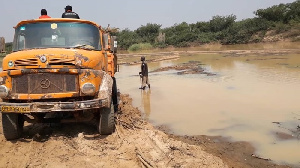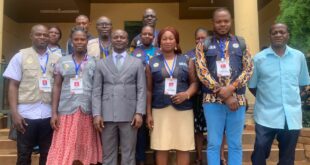Some towns along the river, particularly Bator, Asutsuare, Akuse Dam, Dodi Island and Mepe Adzigo, have been experiencing the most negative impacts of this menace in relation to environmental degradation – including the destruction of roads due to regular transportation activities of tipper-trucks.
Reliable information available to the B&FT indicated that some Ghanaians are fronting for Chinese companies to win sand in the Volta River, specifically at Asutsuare not far from the Akuse Dam, and the Dodi Island where a Chinese company is currently operating.
Meanwhile, the Minerals Commission has said sand-winning is categorised as a small-scale mining operation and does not include participation by foreigners.
Speaking to the B&FT on the issue, Head of Communications at the Minerals Commission, Isaac Abraham, said certified and regulated sand-winning is the sole preserve of Ghanaians – and even at that, the activity is not permitted to take place at river-bodies and the seashore.
The Commission noted that it does not have the arresting authority to bring these perpetrators to book.
Indeed, the Minister of Lands and Natural Resources, Samuel Abu Jinapor, has said all issues concerning mining in the various regions must be handled by the regional security councils headed by regional ministers, in collaboration with the chiefs and district assemblies.
Unfortunately, it remains unclear where these culprits got their permits to undertake such activities even in broad daylight.
It is feared that the continuous incisions in the riverbeds may gradually make communities such as Battor, Mepe, Dodi and others cave-in, as excessive river-sand extraction is said to not only affect the aquatic ecosystem but also physical environments beyond the river.
Ghana loses about 2.7 million m2 of its ocean and river shores every year, with 80 percent of the shoreline actively eroding. Coastal erosion and flooding are particularly serious in Greater Accra, where sea levels are rising and increases in erosion-intensity raise the chance of flooding by 20 percent.
A recent World Bank-Ghana Country Environmental Analysis (CEA) has stated that the country has been losing some GH¢36billion (US$6.3billion) to environmental degradation every year. The degradation comprises destruction of forests, illegal and unregulated sand-winning from the beaches and river-bodies, the scourge of galamsey, the use of terribly over-aged vehicles on our roads, and the use of bio-mass (unregulated felling of trees for firewood).
 Home Of Ghana News Ghana News, Entertainment And More
Home Of Ghana News Ghana News, Entertainment And More





